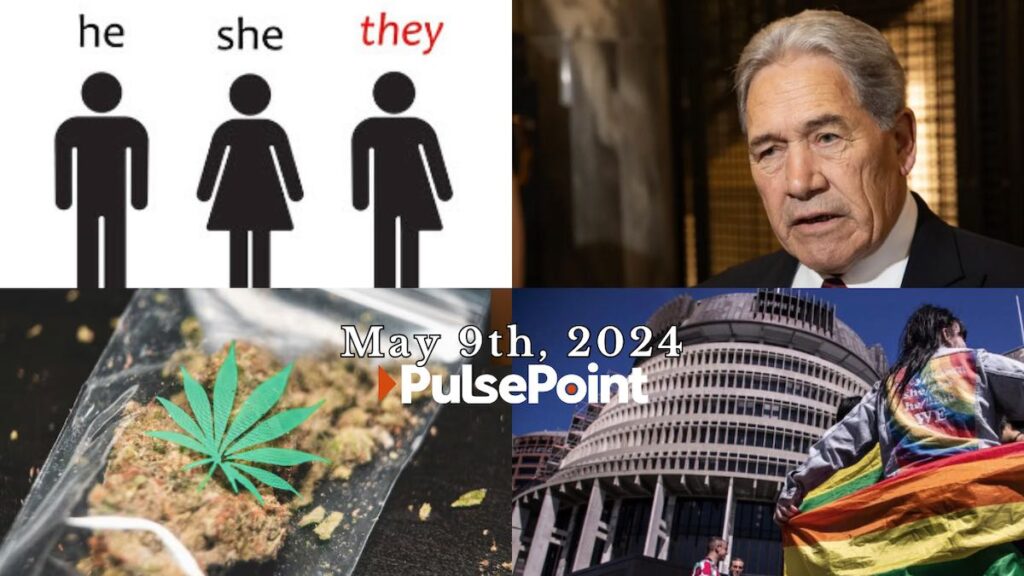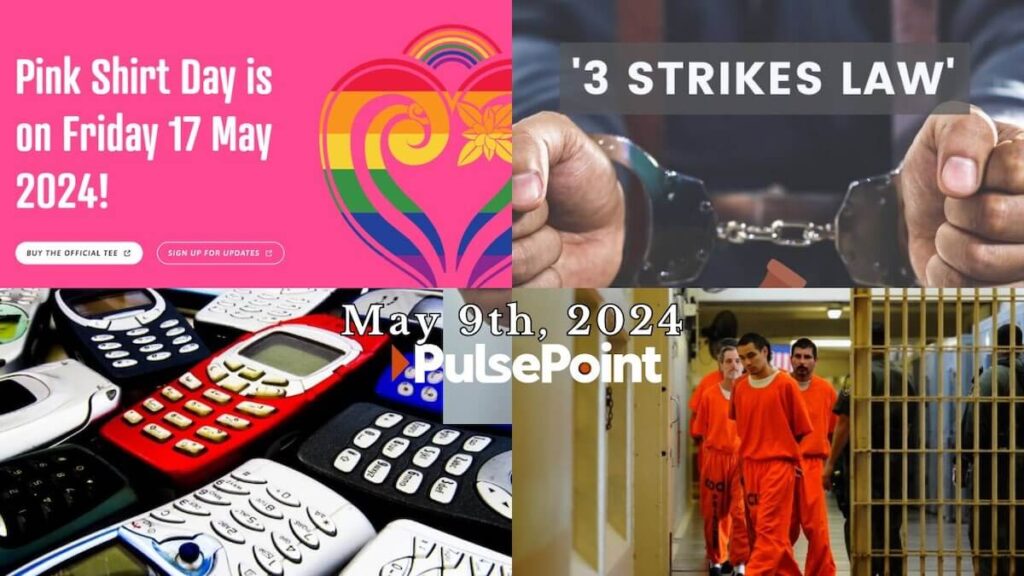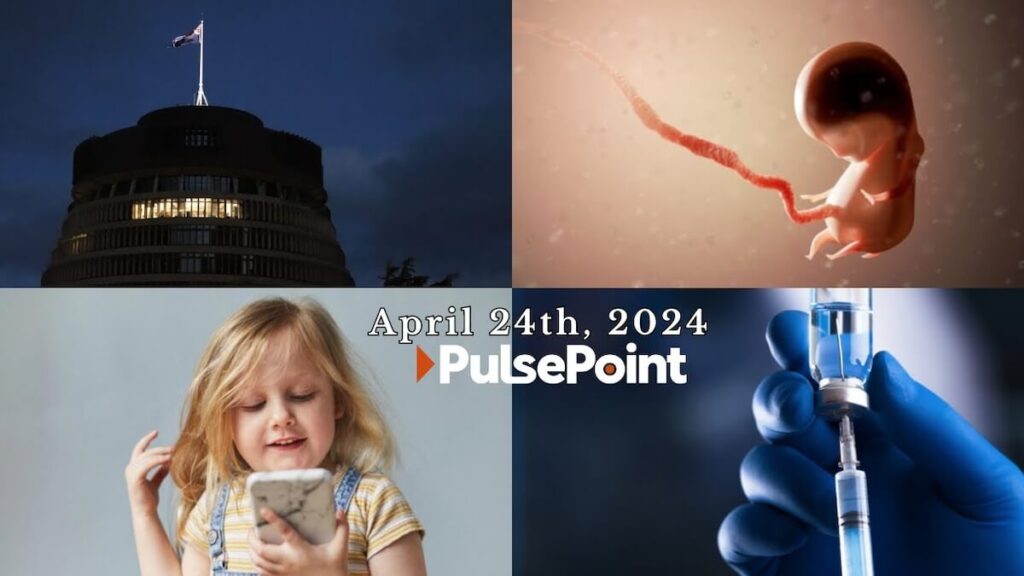Welcome to PulsePoint – the latest media stories and research related to family and society that you need to know about – issues from both New Zealand and overseas that the Family First team have been monitoring and researching over the last week. It’s time to cut through the spin and uncover the real issues.
On this episode of PulsePoint:
1. There is new polling out on what kiwis think about the treatment of children who experience gender confusion. 1:04
2. Australian politicians have abused each other. One is taken to court. 3:26
3. The NHS in the UK has declared that sex is biological. 4:53
4. There is now a Ban on phone in schools. Do the public support it? 6:17
5. France to ban smartphones for kids under thirteen. 7:17
6. Is the Biden administration softening the marijuana laws in the US? 8:12
You can check out all these stories and more on our website FamilyFirst.nz. We’ll keep watching the news… so that you don’t have to.
Intro: Welcome to PulsePoint – the LATEST media stories AND research related to family and society that YOU need to know about – issues from both New Zealand AND overseas. It’s time to cut through the spin and uncover the REAL issues.
I’m Tumby Stowers.
1. A new poll commissioned by Family First and surveyed by Curia Market Research has asked a number of questions around gender ideology and the treatment of children who experience gender confusion.
Almost two out of three (62%) respondents support banning puberty blockers for children aged 16 or younger, with just 19% opposed. Opposition to puberty blockers has grown since December 2020 when a similar poll showed 51% support for a ban and 28% opposition.
A majority (53%) of respondent’s support banning puberty blockers, cross-sex hormones and physical sex-change surgeries for all children under the age of 18, with just 24% opposed.
A majority (53%) of respondents think treatment of young persons who want to change their gender should primarily focus on mental health treatment rather than chemical treatment. Only 10% support chemical treatment being the primary focus. The remainder were unsure or refused to say.
Only 15% think primary age children should be taught they can choose their gender and that it can be changed through hormone treatment and surgery if they want it to be, while two out of three (69%) say they shouldn’t. Opposition to gender ideology has grown significantly from a similar poll in 2019 where only 54% said children should not be taught this, and 35% said they should. Perhaps the opposition has grown to this curriculum because groups like Family First and others have exposed what is actually in the curriculum.
And finally, Only 16% of respondents support taxpayers funding gender change surgery or hormone treatments, with 68% opposed. Labour’s budget in 2022 included an additional $2.2 million for gender affirming care and $2.5 million to train GPs in advising trans youth. They had previously pledged $3 million over four years in their 2019 budget.
These results suggest that the public are becoming increasingly concerned about gender ideology in our classrooms and being targeted at our young people.
You can READ THE FULL POLL RESULTS on our website familyfirst.nz
2. Across the Tasman (Taz-muhn), an online dispute between politicians has landed in court. One Nation leader Pauline Hanson is being sued by Greens senator Mehreen Faruqi over claims of racial discrimination over a social media post.
In September 2022, with the announcement of Queen Elizabeth’s passing, Greens politician Senator Faruqi tweeted she could not mourn the leader of a racist empire built on stolen lives, land and wealth of colonised peoples.
In response, Senator Hanson tweeted Faruqi had immigrated to and taken advantage of what Australia had to offer yet was still unhappy, so she should pack her bags and off back to Pakistan.
Senator Faruqi claims Senator Hanson violated section 18C of the Racial Discrimination Act with her tweet, particularly the “pack your bags and off back to Pakistan”, saying that this caused her sleepless nights and extreme trauma.
The courtroom showdown kicked off this week and will be a test case for what counts as legitimate free speech. Do you think either of these constitute ‘hate’ speech, and if so, which one? Let us know your answer in the comments section. Ironically, the Greens Senator also said this in their Parliament.
Apparently, she doesn’t think that’s hate speech – even though it is.
3. In a radical decision but a victory for truth, the National Health Service in the UK is to declare that sex is a matter of biology, in a landmark shift against gender ideology.
Changes to the health service’s written constitution proposed by ministers will for the first time ban trans women from women-only wards, and give women the right to request a female doctor for intimate care.
The clarification means that the right to a single-sex ward will result in patients “not having to share sleeping accommodation with patients of the opposite biological sex”.
Women’s rights campaigners said the move was a “return to common sense and an overdue recognition that women’s wellbeing and safety matter.”
The changes to the constitution are a further indication of a change in attitudes after the Cass Review into the NHS’s gender identity services found evidence that allowing children to change gender was built on weak foundations.
The proposed changes will also see discrimination requirements updated, with the word gender replaced with sex.
This cartoon was in the Telegraph newspaper in the UK after the announcement – saying that there had been an…. “outbreak of common sense”. We need that in New Zealand also.
4. The Government’s much-talked-about cell phone ban came into force across the New Zealand education sector this week.
The regulations require schools to ensure students do not use or access a phone while they are attending school, including during lunch time and breaks. This includes students who are on a school course or visit outside the school grounds.
There will be exceptions, including health, learning support, education and special circumstances decided by the Principal.
A poll commissioned by Family First and done by Curia Market Research last August found that 67% support a cellphone ban for students in schools. Only 30% were opposed.
Here is a clip of whether parents are on board with this new law:
Kiwi kids were also recently ranked fifth in the world for being distracted by digital devices. The Government hopes the new rule will reverse that trend.
5. And while we are on the topic, according to a French report JUST released, Children should not be allowed to use smartphones until they are 13 and should be banned from accessing conventional social media such as TikTok, Instagram and Snapchat until they are 18.
The French president had asked scientists and experts to suggest screen use guidelines for children with a view to France taking unprecedented steps on limiting their exposure. It was unclear how the government might now proceed after the report’s publication. The hard-hitting report said children needed to be protected from the tech industry’s profit-driven “strategy of capturing children’s attention, using all forms of cognitive bias to shut children away on their screens, control them, re-engage them and monetise them”.
There seems to finally be an awakening all around the world to the effects of phone based childhoods and its effect on our young people.
6. And finally, just as we were preparing this episode, the news broke that the Biden Administration in the US plans to reschedule marijuana to Schedule III.
It is important to note that this does not mean marijuana is going to be legalized—it will remain illegal. But if implemented, moving marijuana to Schedule III from Schedule 1 where it is currently would give Big Marijuana billions in tax write-offs as well as continue the normalization of high-potency THC drugs in the public eye.
Schedule III substances in the US are defined as drugs with a moderate to low potential for physical and psychological dependence. Yet marijuana has only become more potent and dangerous to mental and physical health.
Here in NZ, cannabis is in Class B which is considered high risk but not as high as meth or cocaine or heroin.
Class B has slightly lesser sentences than Class A drugs. There is police discretion which says that consideration should be given to whether a health approach is more beneficial when determining a prosecution, but the public interest must also be considered.
Read more about the cannabis issue in NZ on our website saynopetodope.nz
And THAT’S the latest episode of PulsePoint. You can check out ALL these stories AND MORE on our website familyfirst.nz. We’ll keep watching the news… so that you don’t have to.
See you next time.



